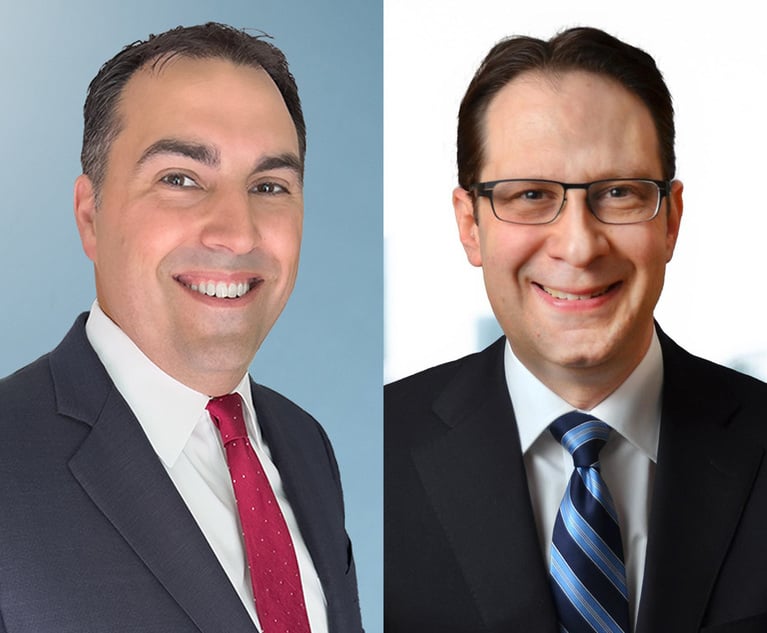Article on Millennials Breaks Free From Conventional Wisdom
Unlike so much tiresome, downbeat, and predictable coverage of legal education and law practice, and because she avoided the temptation to pick winners and losers, Ms. DeSantis portrays a vibrant, frankly exciting job market in the new world of law.
January 24, 2018 at 09:00 AM
3 minute read

Bravo! The New York Law Journal is an important publication serving as the paper of record for the legal community. It is also a reliable essential tool for keeping abreast of court decisions, legislation, and hard news about the profession. Susan DeSantis demonstrates how the paper also can be useful and a must read in other ways in her original, well researched, insightful, forward looking article “Millennial Attorneys Explain Why They Flock to Midsize Firms” (Thursday, January 18, p. 1).
The article is a fine example of discerning and attempting to understand trends in what always has been, and now is more so than ever, a dynamic, constantly evolving, competitive profession. Ms. DeSantis breaks free from conventional wisdom and resists looking in the rear view mirror when reporting on where the job market for recent graduates is heading. The result is a report that no doubt is provoking lively discussions about what new lawyers, employers and clients desire as they weigh their options. Unlike so much tiresome, downbeat, and predictable coverage of legal education and law practice, and because she avoided the temptation to pick winners and losers, Ms. DeSantis portrays a vibrant, frankly exciting job market in the new world of law.
Her findings ring true. To their credit, as DeSantis' extensive interviews underscore, millennials want to make a difference. They seek meaningful work and will pursue opportunities where they can develop professionally. They desire recognition for their accomplishments, and they are interested in jobs that allow personal enrichment and fulfillment outside the office. Millennials are hardly all alike, and, in fact, they respond to circumstances in contrast to the one-size-fits-all past approaches to legal education and entry level jobs in the profession. Now they know what they want, have information about where to find it, and will go after jobs wherever they may be that promise to meet their aspirations.
In this vein, it would be valuable to see even more coverage of developing treads. Increasingly, our graduates, and particularly law graduates pursuing jobs within the tri-state area, in addition to an array of jobs in different kinds of law firms, can find appealing in-house positions and many want to make good use of their legal education in jobs that may not be in a General Counsel's office. A law degree also can lead to a challenging job in finance or, for example, in a start-up business. Other major career trends point to the multinational, borderless nature of virtually every area of law, the value of proficiency in legal English in a multilingual, multicultural market, and the myriad practical issues relating to how law must be practiced in a digital marketplace. The implications for law schools and the need for them to adapt and adopt prudent innovations is clear. Millennials take a more consumerist attitude toward education than previous generations. As law students, they see themselves as customers paying for a service, and they are quick to judge whether a school rises to their expectations and needs. That is why law schools throughout New York and across the country are changing how and what students are taught, so that their graduates can land the jobs that they desire. This small sample of topics strongly suggests that the readers of NYLJ would benefit from more articles that look around corners at the future.
Nicholas W. Allard is the president and Joseph Crea Dean of Brooklyn Law School.
This content has been archived. It is available through our partners, LexisNexis® and Bloomberg Law.
To view this content, please continue to their sites.
Not a Lexis Subscriber?
Subscribe Now
Not a Bloomberg Law Subscriber?
Subscribe Now
NOT FOR REPRINT
© 2025 ALM Global, LLC, All Rights Reserved. Request academic re-use from www.copyright.com. All other uses, submit a request to [email protected]. For more information visit Asset & Logo Licensing.
You Might Like
View All
Long Island Midsize Firm and Managing Partner Sued for Sexual Harassment, Discrimination
6 minute read
King & Spalding Adds Veteran Antitrust Litigator From White & Case in New York
3 minute read

Troutman Pepper Accused of Inattentive Case Management in $59M Malpractice Suit
7 minute readTrending Stories
- 1Munger, Gibson Dunn Billed $63 Million to Snap in 2024
- 2January Petitions Press High Court on Guns, Birth Certificate Sex Classifications
- 3'A Waste of Your Time': Practice Tips From Judges in the Oakland Federal Courthouse
- 4Judge Extends Tom Girardi's Time in Prison Medical Facility to Feb. 20
- 5Supreme Court Denies Trump's Request to Pause Pending Environmental Cases
Who Got The Work
J. Brugh Lower of Gibbons has entered an appearance for industrial equipment supplier Devco Corporation in a pending trademark infringement lawsuit. The suit, accusing the defendant of selling knock-off Graco products, was filed Dec. 18 in New Jersey District Court by Rivkin Radler on behalf of Graco Inc. and Graco Minnesota. The case, assigned to U.S. District Judge Zahid N. Quraishi, is 3:24-cv-11294, Graco Inc. et al v. Devco Corporation.
Who Got The Work
Rebecca Maller-Stein and Kent A. Yalowitz of Arnold & Porter Kaye Scholer have entered their appearances for Hanaco Venture Capital and its executives, Lior Prosor and David Frankel, in a pending securities lawsuit. The action, filed on Dec. 24 in New York Southern District Court by Zell, Aron & Co. on behalf of Goldeneye Advisors, accuses the defendants of negligently and fraudulently managing the plaintiff's $1 million investment. The case, assigned to U.S. District Judge Vernon S. Broderick, is 1:24-cv-09918, Goldeneye Advisors, LLC v. Hanaco Venture Capital, Ltd. et al.
Who Got The Work
Attorneys from A&O Shearman has stepped in as defense counsel for Toronto-Dominion Bank and other defendants in a pending securities class action. The suit, filed Dec. 11 in New York Southern District Court by Bleichmar Fonti & Auld, accuses the defendants of concealing the bank's 'pervasive' deficiencies in regards to its compliance with the Bank Secrecy Act and the quality of its anti-money laundering controls. The case, assigned to U.S. District Judge Arun Subramanian, is 1:24-cv-09445, Gonzalez v. The Toronto-Dominion Bank et al.
Who Got The Work
Crown Castle International, a Pennsylvania company providing shared communications infrastructure, has turned to Luke D. Wolf of Gordon Rees Scully Mansukhani to fend off a pending breach-of-contract lawsuit. The court action, filed Nov. 25 in Michigan Eastern District Court by Hooper Hathaway PC on behalf of The Town Residences LLC, accuses Crown Castle of failing to transfer approximately $30,000 in utility payments from T-Mobile in breach of a roof-top lease and assignment agreement. The case, assigned to U.S. District Judge Susan K. Declercq, is 2:24-cv-13131, The Town Residences LLC v. T-Mobile US, Inc. et al.
Who Got The Work
Wilfred P. Coronato and Daniel M. Schwartz of McCarter & English have stepped in as defense counsel to Electrolux Home Products Inc. in a pending product liability lawsuit. The court action, filed Nov. 26 in New York Eastern District Court by Poulos Lopiccolo PC and Nagel Rice LLP on behalf of David Stern, alleges that the defendant's refrigerators’ drawers and shelving repeatedly break and fall apart within months after purchase. The case, assigned to U.S. District Judge Joan M. Azrack, is 2:24-cv-08204, Stern v. Electrolux Home Products, Inc.
Featured Firms
Law Offices of Gary Martin Hays & Associates, P.C.
(470) 294-1674
Law Offices of Mark E. Salomone
(857) 444-6468
Smith & Hassler
(713) 739-1250






